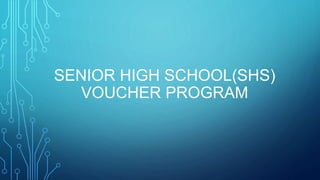SHS-VOUCHER-PROGRAM.pptx
•Transferir como PPTX, PDF•
0 gostou•47 visualizações
SHS Voucher Program Presentation
Denunciar
Compartilhar
Denunciar
Compartilhar

Recomendados
Recomendados
Mais conteúdo relacionado
Semelhante a SHS-VOUCHER-PROGRAM.pptx
Semelhante a SHS-VOUCHER-PROGRAM.pptx (20)
Levie M. Discaya - Comparative Analysis of R.A. 6728 and R.A.8545 

Levie M. Discaya - Comparative Analysis of R.A. 6728 and R.A.8545
Block grant and block grant formulae for the education sector (lao pdr)

Block grant and block grant formulae for the education sector (lao pdr)
Mais de RuthCarinMalubay
Mais de RuthCarinMalubay (20)
Último
Mehran University Newsletter is a Quarterly Publication from Public Relations OfficeMehran University Newsletter Vol-X, Issue-I, 2024

Mehran University Newsletter Vol-X, Issue-I, 2024Mehran University of Engineering & Technology, Jamshoro
https://app.box.com/s/7hlvjxjalkrik7fb082xx3jk7xd7liz3TỔNG ÔN TẬP THI VÀO LỚP 10 MÔN TIẾNG ANH NĂM HỌC 2023 - 2024 CÓ ĐÁP ÁN (NGỮ Â...

TỔNG ÔN TẬP THI VÀO LỚP 10 MÔN TIẾNG ANH NĂM HỌC 2023 - 2024 CÓ ĐÁP ÁN (NGỮ Â...Nguyen Thanh Tu Collection
Último (20)
TỔNG ÔN TẬP THI VÀO LỚP 10 MÔN TIẾNG ANH NĂM HỌC 2023 - 2024 CÓ ĐÁP ÁN (NGỮ Â...

TỔNG ÔN TẬP THI VÀO LỚP 10 MÔN TIẾNG ANH NĂM HỌC 2023 - 2024 CÓ ĐÁP ÁN (NGỮ Â...
Seal of Good Local Governance (SGLG) 2024Final.pptx

Seal of Good Local Governance (SGLG) 2024Final.pptx
On National Teacher Day, meet the 2024-25 Kenan Fellows

On National Teacher Day, meet the 2024-25 Kenan Fellows
Unit-V; Pricing (Pharma Marketing Management).pptx

Unit-V; Pricing (Pharma Marketing Management).pptx
Mixin Classes in Odoo 17 How to Extend Models Using Mixin Classes

Mixin Classes in Odoo 17 How to Extend Models Using Mixin Classes
Unit-IV; Professional Sales Representative (PSR).pptx

Unit-IV; Professional Sales Representative (PSR).pptx
ICT Role in 21st Century Education & its Challenges.pptx

ICT Role in 21st Century Education & its Challenges.pptx
Jual Obat Aborsi Hongkong ( Asli No.1 ) 085657271886 Obat Penggugur Kandungan...

Jual Obat Aborsi Hongkong ( Asli No.1 ) 085657271886 Obat Penggugur Kandungan...
ICT role in 21st century education and it's challenges.

ICT role in 21st century education and it's challenges.
General Principles of Intellectual Property: Concepts of Intellectual Proper...

General Principles of Intellectual Property: Concepts of Intellectual Proper...
SHS-VOUCHER-PROGRAM.pptx
- 1. SENIOR HIGH SCHOOL(SHS) VOUCHER PROGRAM
- 2. POLICY OBJECTIVES 1. From a pragmatic perspective, vouchers will reduce the institutional pressures on the Department; 2. Engaging the private sector through vouchers would also minimize capital costs associated with constructing and equipping classrooms and laboratories; and 3. The subsidy would lessen the financial impact on colleges and universities which will experience reduced enrollment in the initial years of the SHS program.
- 3. PURPOSE OF THE SHS SUBSIDY PROGRAM: 1. Enhance school diversity, dynamism and empowerment, and enable choice of students and their families leading, ultimately, to the very purpose of the K-12 reform: relevant and high quality education; 2. Vouchers can impact substantially by increasing the diversity of providers beyond the current configuration at the elementary and JHS levels; 3. DepEd would like to establish a system that provides greater choice and makes this choice available even to those who do not have the financial means to support their children’s education on their own.
- 4. DESIGN PARAMETERS • is easily scalable and accommodate more that a million students in 2 years’ time • minimizes discretion and conflict of interest situations and other governance related issues • is efficient from a public fiscal standpoint • is equitable and allows poor students to participate • has built-in accountability mechanisms that lead to improvement of quality • is administratively simple and feasible, provided appropriate systems are in place
- 5. STUDENT ELIGIBILITY • All Grade 10 JHS completers from public and private schools in the country
- 6. SHELF LIFE Vouchers must be used in the school year immediately following the year of JHS completion. The SHS voucher shall cover two (2) years of SHS, regardless of whether the voucher recipient decides to transfer to another non-DepEd school within those two years. A voucher recipient that will take more than two years to complete his SHS education can only avail of the voucher subsidy for two (2) years.
- 7. PROVIDER ELIGIBILITY All non-DepEd schools with an SHS permit for the DepEd can accept voucher students. Vouchers can be redeemed in any region and the value is determined by the location of the non-DepEd SHS.
- 8. TOP-UPS • Non-DepEd providers will be allowed to charge a top-up in cases where the voucher subsidy is less than the tuition the charge. To mitigate the impact on the least affluent students, DepEd enjoins non- DepEd schools to minimize the the top-up by providing additional subsidies or by partnering with LGUs and industry to share the top-up burden.
- 9. VOUCHER VALUE Table 1. SHS VOUCHER VALUE National Capital Region (NCR) • Full Value – Php 22,500 • 80% Value – Php 18,000 • 50% Value – Php 11,250 Non-NCR Highly Urbanized Cities (HUCs) • Full Value – Php 20,000 • 80% Value – Php 16,000 • 50% Value – Php 10,000 Non-HUCs • Full Value – Php 17,500 • 80% Value – Php 14,000 • 50% Value – Php 8,750 Estimated Weighted Average Voucher Value Php 18,300
- 10. VOUCHER MANAGEMENT SYSTEM A management information system will be developed to facilitate the effective administration and monitoring of the voucher program. The DepEd’s Learner Information System (LIS) will generate data on eligible data on the eligible voucher grantees in Grade 10 in public JHSs. Meanwhile, the ESC Management Information System is expected to provide data on eligible voucher grantees in Grade 10 in private JHSs. The Voucher Management System will have functionalities that will allow for the online submission of enrollment and billing statements, the cross-checking of names and other data, the addition of new names (for non-public, non-ESC voucher recipients) or the transfer of students to public or other non-DepEd SHSs, the submission of periodic reports and other critical requirements for the effective and efficient management of the program.
- 11. THANK YOU!